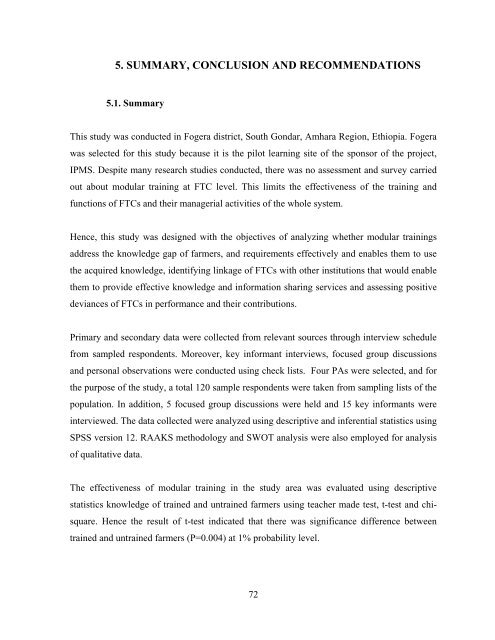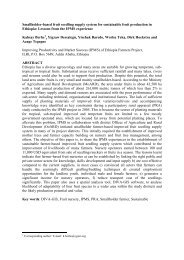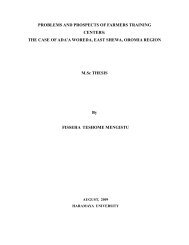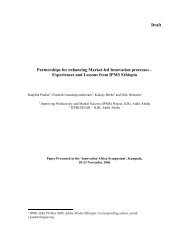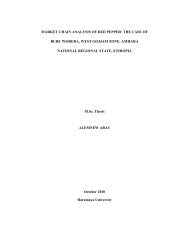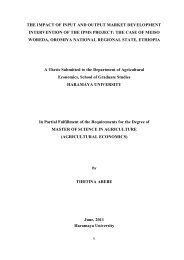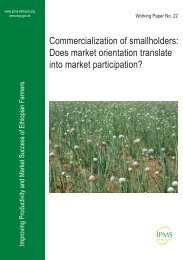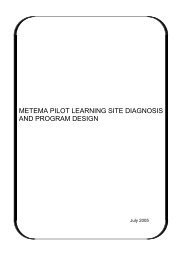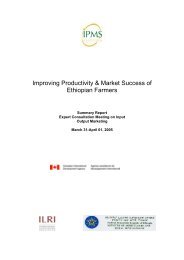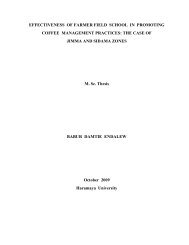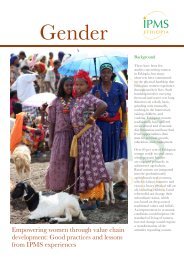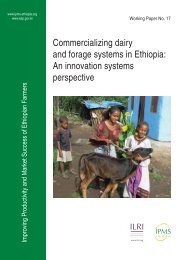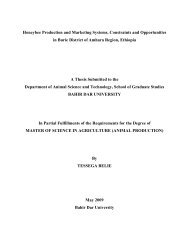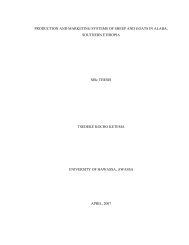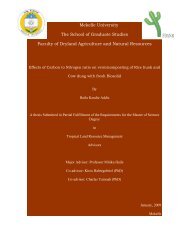effectiveness of modular training at farmers - IPMS Information ...
effectiveness of modular training at farmers - IPMS Information ...
effectiveness of modular training at farmers - IPMS Information ...
You also want an ePaper? Increase the reach of your titles
YUMPU automatically turns print PDFs into web optimized ePapers that Google loves.
5. SUMMARY, CONCLUSION AND RECOMMENDATIONS5.1. SummaryThis study was conducted in Fogera district, South Gondar, Amhara Region, Ethiopia. Fogerawas selected for this study because it is the pilot learning site <strong>of</strong> the sponsor <strong>of</strong> the project,<strong>IPMS</strong>. Despite many research studies conducted, there was no assessment and survey carriedout about <strong>modular</strong> <strong>training</strong> <strong>at</strong> FTC level. This limits the <strong>effectiveness</strong> <strong>of</strong> the <strong>training</strong> andfunctions <strong>of</strong> FTCs and their managerial activities <strong>of</strong> the whole system.Hence, this study was designed with the objectives <strong>of</strong> analyzing whether <strong>modular</strong> <strong>training</strong>saddress the knowledge gap <strong>of</strong> <strong>farmers</strong>, and requirements effectively and enables them to usethe acquired knowledge, identifying linkage <strong>of</strong> FTCs with other institutions th<strong>at</strong> would enablethem to provide effective knowledge and inform<strong>at</strong>ion sharing services and assessing positivedeviances <strong>of</strong> FTCs in performance and their contributions.Primary and secondary d<strong>at</strong>a were collected from relevant sources through interview schedulefrom sampled respondents. Moreover, key informant interviews, focused group discussionsand personal observ<strong>at</strong>ions were conducted using check lists. Four PAs were selected, and forthe purpose <strong>of</strong> the study, a total 120 sample respondents were taken from sampling lists <strong>of</strong> thepopul<strong>at</strong>ion. In addition, 5 focused group discussions were held and 15 key informants wereinterviewed. The d<strong>at</strong>a collected were analyzed using descriptive and inferential st<strong>at</strong>istics usingSPSS version 12. RAAKS methodology and SWOT analysis were also employed for analysis<strong>of</strong> qualit<strong>at</strong>ive d<strong>at</strong>a.The <strong>effectiveness</strong> <strong>of</strong> <strong>modular</strong> <strong>training</strong> in the study area was evalu<strong>at</strong>ed using descriptivest<strong>at</strong>istics knowledge <strong>of</strong> trained and untrained <strong>farmers</strong> using teacher made test, t-test and chisquare.Hence the result <strong>of</strong> t-test indic<strong>at</strong>ed th<strong>at</strong> there was significance difference betweentrained and untrained <strong>farmers</strong> (P=0.004) <strong>at</strong> 1% probability level.72


